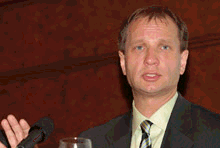
Typical street scene in Santa Ana, El Salvador. (Photo: iStock)
IMF Survey: IMF Makes $800 Million Available to El Salvador
January 16, 2009
- Program aims to bolster confidence amid electoral uncertainly
- IMF precautionary arrangement supplements financing from other multilateral institutions
- Country enhancing banking sector's ability to respond to shocks
The IMF's Executive Board has approved an $800 million precautionary Stand-By Arrangement for El Salvador to help the country respond to temporary shocks to confidence, including election-related uncertainty and fallout from the global financial crisis.

Garment factory in El Salvador: the program aims to bolster confidence in the economy and, if necessary, provide an additional liquidity buffer for the financial sector (photo: Newscom)
Latin America
The Salvadoran authorities do not intend to draw on the resources made available under the 14½-month arrangement, unless the need arises.
In an interview, the IMF's mission chief for El Salvador, Alfred Schipke, talks about the impact of the global financial crisis on El Salvador, the precautionary nature of the economic program, and the challenges surrounding the future of the country's economic policies.
IMF Survey online: The IMF has just approved El Salvador's request for a precautionary Stand-By Arrangement. Why do the authorities not intend to draw on this loan?
Schipke: Indeed, today the IMF's Executive Board approved El Salvador's request for an $800 million precautionary arrangement.
El Salvador has strong economic fundamentals, a moderate public debt-to-GDP ratio, and is not currently facing balance of payments pressures.
Nevertheless, the authorities have been proactive to reduce the impact of the global financial turmoil, the U.S. recession, and election-related uncertainty on the economy. As part of this strategy, they have sought reasonably priced external financing from multilateral institutions and have negotiated loans with the World Bank and the Inter-American Development Bank—both for budget support and to increase the supply of bank credit. These are actions that should be commended.
In addition, the authorities requested support from the Fund late last year. This is merely a precautionary measure since, as I mentioned, El Salvador is not facing pressures on its balance of payments. The goal of the precautionary arrangement is to bolster confidence in the economy and, if necessary, provide an additional liquidity buffer for the financial sector.
IMF Survey online: Why did El Salvador request a Stand-By Arrangement and not the IMF's new liquidity facility?
Schipke: The new Short-Term Liquidity Facility cannot be used as a precautionary arrangement. A member country that seeks (and obtains) access to this facility is expected to draw on Fund resources at once. Because of this, the Short-Term Liquidity Facility would not be a good option for El Salvador, which is trying to bolster its defenses but does not need the resources at this time.

Schipke: So far, the impact of the global financial crisis on El Salvador has been limited, but there are signs of a significant slowdown in growth (IMF photo).
El Salvador also differs from most of the countries that have requested Fund assistance in recent months. These were countries that were facing intense balance of payments pressures and intended to draw on Fund resources when they approached the IMF. This is not the case in El Salvador. By approving a precautionary Stand-By Arrangement for El Salvador, the Fund is showing that it has the flexibility to craft its assistance in the way that is most useful to its member countries.
IMF Survey online: Could you update us on the economic situation in El Salvador? How seriously has the country been affected by the financial turmoil and the U.S. recession? In particular, what is the impact of the slowdown in remittance flows?
Schipke: There are indeed strong linkages between the United States and El Salvador. In addition to remittances, the United States is El Salvador's main export market, and there are also strong financial sector linkages.
So far, the impact of the global financial crisis on El Salvador has been limited, but there are signs of a significant slowdown in growth. Remittances have been adversely affected and strong remittance growth is not likely to resume soon. This, of course, will impact the most vulnerable. In this regard, the government's commitment to increase social spending by expanding the coverage of Red Solidaria—a cash transfer program—to the 100 poorest municipalities is an important step.
The good news is that, so far, exports have been holding up quite well despite the U.S. recession, and the financial system is highly liquid and well-capitalized. Overall, while there is no doubt that 2009 will be a difficult year, the country is in a good position to weather the storm.
IMF Survey online: El Salvador will hold presidential elections this March. How will the authorities ensure the continuity of the program during the political transition?
Schipke: This is not just a program of the current government. The two leading presidential candidates have publicly expressed support for the main elements of the economic program and have reiterated their commitment to maintaining macroeconomic stability and dollarization.
This commitment is an important element of the program, which should ensure policy continuity. It also demonstrates that there is broad consensus in society about the importance of maintaining economic stability.
IMF Survey online: El Salvador is an officially dollarized economy, with limited policy tools to weather the current global crisis. What specific measures are the authorities taking to minimize the impact of potential shocks?
Schipke: El Salvador is officially dollarized (as are two other countries in the region—Ecuador and Panama); it has no domestic currency or monetary policy. In view of this, the authorities have taken a number of important steps to reinforce the economy's resilience to shocks. First, they are committed to continue pursuing a sound fiscal policy that keeps public debt on a sustainable path. Second, they have increased the liquidity buffer of the financial system and are upgrading the regulatory and supervisory framework. In this context, shoring up financing from the World Bank, the Inter-American Development Bank, and the IMF are measures geared at increasing the resilience of the economy and the financial system to shocks.
Comments on this article should be sent to imfsurvey@imf.org


